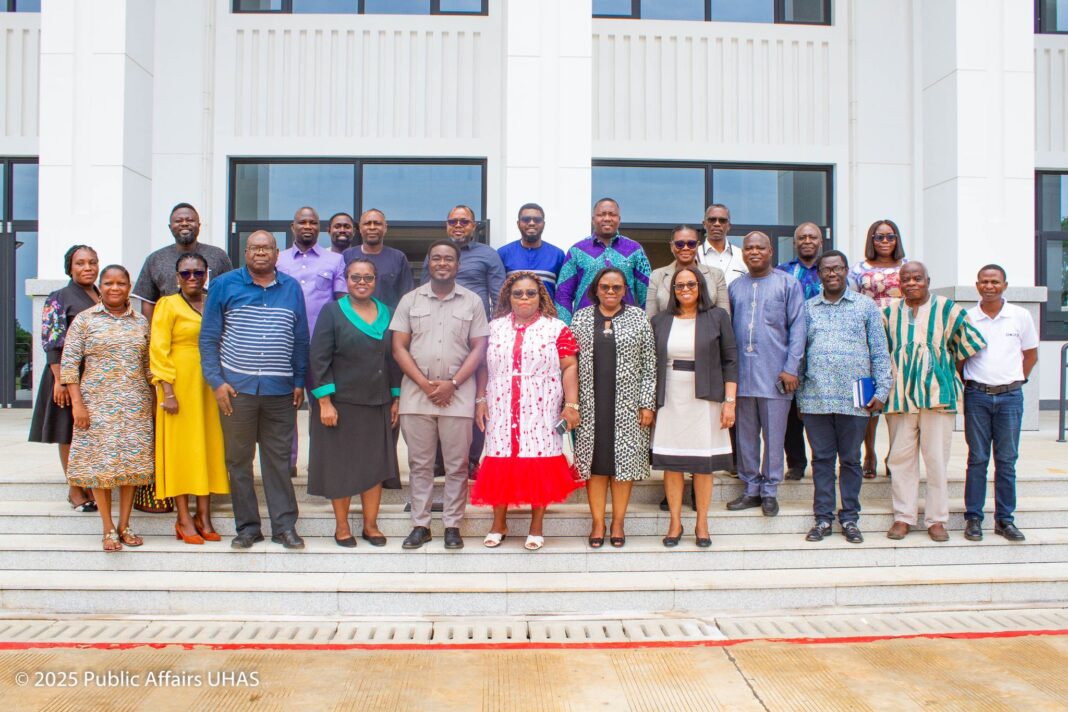The University of Health and Allied Sciences (UHAS) hosted a delegation led by Dr. Sodzi Sodzi-Tettey, the Chief Executive Officer (CEO) of the National Vaccine Institute (NVI), with representatives from Deutsche Gesellschaft für Internationale Zusammenarbeit (GIZ), United Nations Industrial Development Organization (UNIDO) and the European Union (EU) on Thursday, April 3, 2025 at the University’s Central Administration block.
The primary agenda of the visit was to explore the possibility of leveraging UHAS’ vaccine research experience in securing funding for a state-of-the-art vaccine research centre at the UHAS’ laboratory complex building, believed to be the largest of its kind in the sub-Saharan Africa.
The Vice Chancellor, Professor Lydia Aziato welcomed the distinguished guests and expressed her optimism about the envisaged partnership between UHAS, NVI, GIZ, UNIDO, EU and others towards putting UHAS on the map of vaccine development research, in view of the specialized expertise and facilities in the University. She highlighted the significant roles the University has so far played in the healthcare sector, elaborating on the University’s academic programmes and notable research achievements that position it as an ideal partner for hosting a cutting-edge vaccine research facility.
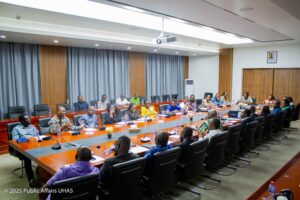
The Vice Chancellor showcased the University’s existing facilities, including the laboratory complex building under construction, which is expected to be used for the vaccine research centre. She also introduced the team to the biggest simulation centre in West Africa which is part of the China-aided Phase 2 project of the University.
The UHAS Vaccine Research Team, represented by Dr. Cornelius Dodoo, a Senior Lecturer at the School of Pharmacy, delivered a presentation titled ‘The Role of UHAS in National Effort Towards Vaccine Development and Production.’ The presentation outlined UHAS’ current vaccine research capabilities and how these could be enhanced through the establishment of a dedicated research centre.
After the presentation, UHAS’ senior vaccine researchers Professor Peter Atadja and Professor Theophilus Adiku, among others, provided additional insights on how the collective UHAS expertise and facilities could contribute to Ghana’s effort to attaining the required level of vaccine development before 2030, when Ghana would be expected to be a middle-income country and therefore could no longer benefit from the Global Alliance for Vaccines and Immunization (Gavi) initiatives in Ghana’s immunization programmes, which currently constitute about 80% of Ghana’s immunization programmes.
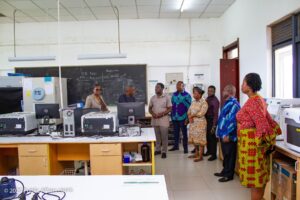
The CEO of NVI, Dr. Sodzi-Tettey, in his remarks elaborated on the National Vaccine Institute’s mandate in supporting institutions in the healthcare space and stimulating discussions towards vaccine development research and vaccine manufacturing in Ghana. He emphasized that UHAS, as an institution wholly dedicated to training healthcare professionals, should be a major stakeholder in the country’s vaccine development efforts.
He particularly stated how the proposed state-of-the-art vaccine research centre at UHAS would strengthen Ghana’s capacity for indigenous vaccine development and manufacturing.
The CEO of NVI said the national agenda towards vaccine development and manufacturing self-sufficiency is constrained by time, as Ghana is expected to attain the required level before 2030.
The European Union Representative, Ms. Juliet Dekuo, pledged to engage in extended discussions with her organization regarding potential financial support for the project.
The UNIDO Representative, Madam Enyo Nudo, expressed her eagerness to facilitate a quick process towards finalizing and signing the PharmaVax project agreement with UHAS which could provide initial support for the establishment of the vaccine research centre.
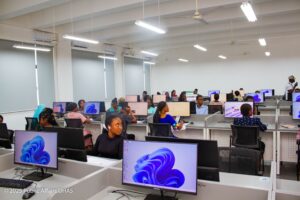
The PharmaVax project is a German vaccine development vehicle that aims at helping Ghana to emerge as a regional hub for vaccine production and reduce Africa’s heavy dependence on pharmaceutical imports.
Madam Nudo also expressed interest in working with the UHAS Institute of Traditional and Alternative Medicine (ITAM) to explore the integration of traditional knowledge into modern vaccine development research.
Dr. Sodzi-Tettey and his team generally expressed admiration for the depth of human and material resources that exist in UHAS, regarding vaccine development and related issues. To them, their visit was an eye-opener.
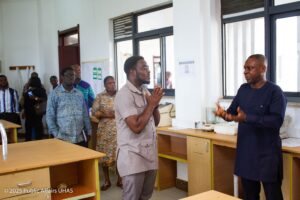
Potential collaboration areas mainly discussed were capacity building in health research and specialized vaccine development training. During the interaction, the representatives from the EU, GIZ and UNIDO also offered perspectives on other funding possibilities and technical support for the proposed research centre. They acknowledged UHAS as an ideal partner for such an initiative and advocated collaboration with local manufacturers to ensure sustainability of the project.
The delegation toured the multi-Purpose laboratory complex building, viewing the various floors and rooms that could be allocated for the proposed vaccine research centre, as well as the ultra-modern UHAS Simulation Center.
Registrar of UHAS, Ms. Yaa Amankwaa Opuni, expressed her delight with the interaction and assured the partners of UHAS’ readiness to play its part in realizing the dream of establishing the state-of-the-art vaccine research centre.
The meeting was attended by Deans, Directors, Senior Researchers, faculty and administrators of the University.

